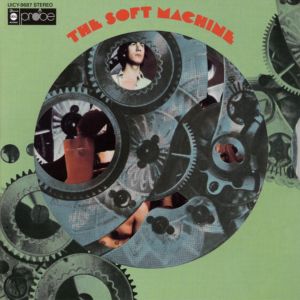
- Format: MP3

The Soft Machine, as reissue also titled "Volume One", is the debut album by the British psychedelic rock band Soft Machine, one of the central bands in the Canterbury scene. The band, founded in 1966, recorded and released this studio album during their 1968 tour of the USA. It was produced by Chas Chandler and Tom Wilson.
Soft Machine (billed as The Soft Machine up to 1969) were formed in the summer of 1966 by Robert Wyatt (drums, vocals), Kevin Ayers (bass, guitar, vocals), Daevid Allen (guitar) and Mike Ratledge (organ) plus, for the first few gigs only, American guitarist Larry Nowlin. Allen, Wyatt and future bassist Hugh Hopper had first played together in the Daevid Allen Trio in 1963, occasionally accompanied by Ratledge. Wyatt, Ayers and Hopper had been founding members of the Wilde Flowers, later incarnations of which would include future members of another Canterbury band, Caravan.
This first Soft Machine line-up became involved in the early UK underground, featuring prominently at the UFO Club, and subsequently other London clubs like the Speakeasy and Middle Earth, and recorded the group's first single ' Love Makes Sweet Music', as well as some demo sessions that were released several years later. They also played in the Netherlands, Germany and on the French Riviera. During July and August 1967, the promoter and manager Giorgio Gomelsky booked shows all along the Cote d'Azur with the band's most notorious early gig taking place in the village square of Saint-Tropez. This led to an invitation to perform at producer Eddie Barclay's trendy "Nuit Psychédélique", performing a forty minute rendition of "We Did It Again", singing the refrain over and over, achieving a Zen-like quality. This made them instant darlings of the Parisian "in" crowd, resulting in invitations to appear on leading television shows and at the Paris Biennale in October 1967. Meanwhile, upon their return from their summer sojourn in France, Allen (an Australian) was denied re-entry to the United Kingdom, so the group continued as a trio, while he returned to Paris to found Gong.
Sharing the same management team as Jimi Hendrix, the band were rewarded with a support slot on the Jimi Hendrix Experience's North America tour throughout 1968. Soft Machine's first album - a psychedelic rock/proto-prog classic - was recorded in New York in April at the end of the first leg. Back in London, eventually guitarist Andy Summers, later of The Police, joined the group, fresh from his stint with Dantalian's Chariot (previously Zoot Money's Big Roll Band). After a few weeks of rehearsals, the new quartet began a tour of the USA with some solo shows before reuniting with Hendrix for a final string of dates in August-September 1968. Summers, however, had in the meantime been fired at the insistence of Ayers. Ayers departed amicably after the final date at the Hollywood Bowl, and for the remainder of 1968 Soft Machine were no more. Wyatt stayed in the US to record solo demos, while Ratledge returned to London and began composing in earnest.
In January 1969, in order to fulfill contractual obligations, Soft Machine reformed with former road manager and composer Hugh Hopper on bass added to Wyatt and Ratledge, and set about recording their second album, Volume Two, which launched a transition towards a purely instrumental sound resembling what would be later called jazz fusion. Notwithstanding the disconcerting personnel changes that came about during this period, this is a fascinating period of creative tension. In May 1969, this lineup acted as the uncredited backup band on two tracks of Syd Barrett's solo debut album, The Madcap Laughs. The base trio was late in 1969 expanded to a septet with the addition of four horn players, though only saxophonist Elton Dean (†) remained beyond a few months, the resulting Soft Machine quartet (Wyatt, Hopper, Ratledge and Dean) running through Third (1970) and Fourth (1971), with various guests, mostly jazz players (Lyn Dobson, Nick Evans, Mark Charig, Jimmy Hastings, Roy Babbington, Rab Spall). Fourth was the first of their fully instrumental albums, and the last one featuring Wyatt.
All members were highly literate in various musical backgrounds, but foremost was the eclectic genius of Ratledge, who through composition, arrangements and improvisational skills propelled a collective output of the highest standard, in which the vocal charm and extraordinarily original drumming of Wyatt, the lyricism of some of Dean's solos and the unusual avant-garde pop angle of Hopper's pieces all had a major role. Their propensity for building extended suites from regular sized compositions, both live and in the studio (already in the Ayers suite in their first album), reaches its maximum in the 1970 album Third, unusual for its time in each of the four sides featuring one suite. Third was also unusual for remaining in print for more than ten years in the United States, and is the best-selling Soft Machine recording.
This period saw them gaining unprecedented acclaim across Europe, and they made history by becoming the first 'rock band' invited to play at London's Proms in August 1970, a show which was broadcast live and later appeared as a live album.
A wild, freewheeling, and ultimately successful attempt to merge psychedelia with jazz-rock, Soft Machine's debut ranges between lovingly performed oblique pop songs and deranged ensemble playing from drummer/vocalist Robert Wyatt and organist Mike Ratledge. With only one real break (at the end of side one), the songs merge into each other — not always smoothly, but always with a sense of flair that rescues any potential miscues. Wyatt takes most of the vocals, and proves himself a surprisingly evocative singer despite his lack of range. Like Pink Floyd's The Piper at the Gates of Dawn, Volume One was one of the few over-ambitious records of the psychedelic era that actually delivered on all its incredible promise.